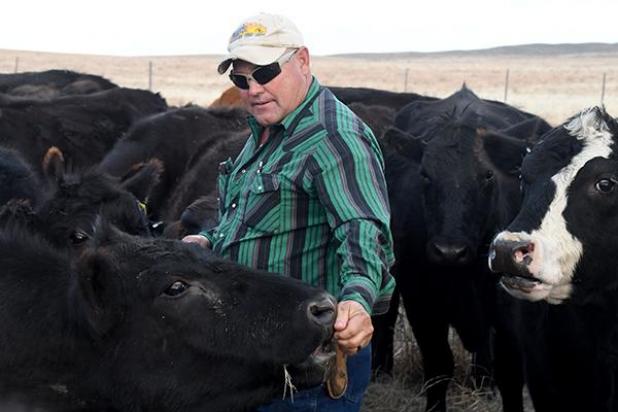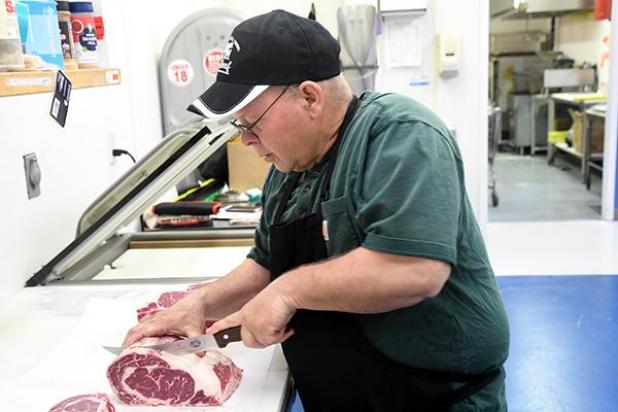
Damon Struckmeyer, surrounded by cattle, feeds them cubes by hand on his land south of Holyoke. — The Holyoke Enterprise | Johnson Publications

Roger Koberstein cuts some rib-eye steaks at Haxtun Super’s. He sells retail cuts to six other grocery stores in Colorado and one in Kansas. — The Holyoke Enterprise | Johnson Publications
More options for direct meat sales on horizon for Coloradans
Beef has been a sizzling topic of conversation over the past few months. Citizens across many Colorado counties and beyond fired up their grills and held public barbecues on March 20, which Gov. Jared Polis had proclaimed “MeatOut Day,” in order to recognize and celebrate the many contributions made by their local ranchers and farmers.
Phillips County commissioners adopted a resolution proclaiming that same day Phillips County Cattlemen’s Day and expressed their support for all legislative actions that strengthen Colorado agriculture, including Colorado Senate Bill 21-079, which was introduced in the Colorado Senate on Feb. 16.
The bill is sponsored by Sen. Jerry Sonnenberg, R-Sterling, Rep. Rod Pelton, R-Cheyenne Wells, and Rep. Donald Valdez, D-La Jara. It concerns the sale of animals for consumption to informed end consumers in a manner that exempts the sale from certain laws. Polis signed the bill into law April 29.
The first section of the bill allows a person to sell, without licensure, regulation, or inspection by a public health agency, rabbit meat if the animal was raised by the seller and to sell shares in the meat of an animal, which includes cattle, calves, sheep, elk, bison, goats, hogs and rabbits for future delivery if the person displays, at the point of sale, a conspicuous disclaimer, or gives the purchaser a document with a disclaimer, that:
— The seller is not subject to licensure and the sale of the animals or meat are not subject to state regulation or inspection by a public health agency.
— The animals or meat are not intended for resale.
— The animals or meat are delivered directly from the seller to an informed end consumer and are sold only in Colorado.
The bill clarifies that the seller is not liable in a civil action for damages caused by inadequately cooking or improperly preparing the meat for consumption.
The second section of the bill limits the number of brand inspections for an animal share sale to a single inspection before slaughter. The state board of stock inspection commissioners will promulgate rules establishing procedures for a single inspection.
Local ranchers share their views
Roger Koberstein has over 20 years in the ranching business and sells beef directly to consumers using a processing plant inspected by the U.S. Department of Agriculture, and his beef is also inspected according to USDA specifications.
He generally sells beef in quarters, halves and wholes, and since the plant he uses is USDA inspected, he can also sell retail cuts of meat directly to the consumer.
He said he delivers the live animal to the processor, and the plant gets the cutting instructions for each share and cuts according to the consumer’s request. He added that processing plants are typically booked out at least six months to a year.
He has been using a processing plant in Evans, Colorado, for about 15 years. The plant has a full-time inspector, which is how many small USDA plants operate. Consumers generally contact him for food, but they sometimes contact the processing plant to request beef from animals he’s raised.
He sees the bill as essentially clarifying the liability for direct sales of meat. An end consumer who potentially receives a bad piece of meat could not go back on the processor or rancher.
Koberstein said the bill clarifies liability for custom-exempt plants, but won’t affect his operation since he uses a plant inspected by the USDA.
Damon Struckmeyer is a farmer, rancher and custom welder who has a feedlot in Yuma County, Colorado, and he has been working in the industry for much of his life. He said the difference between USDA and custom-exempt plants is in how they’re inspected.
He noted that in order to sell retail cuts of meat to a consumer, he would have to use a processing plant with a USDA inspector. He could only use plants not inspected by the USDA if he were getting retail cuts of meat for his own or his family’s consumption, but not to sell to another person.
Struckmeyer echoed Koberstein about the bottleneck that can be at processing plants. He said most plants are about a year out on making appointments.
He usually gets hamburger made about once a year for his own consumption. He picked up meat in August, 2020, and made another appointment for this coming August, which was the soonest available.
“It would make it a lot easier for the cattlemen to sell their product and for the consumer to purchase meat,” Struckmeyer said, speaking of the bill’s impact.
He added that he feels it will be a positive for the Holyoke area and will open up more options for both ranchers and consumers.
“Anything that puts our product in a positive light is a good thing,” he said.
Read the full article in our FREE Salute to Beef section. Click here!
